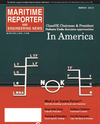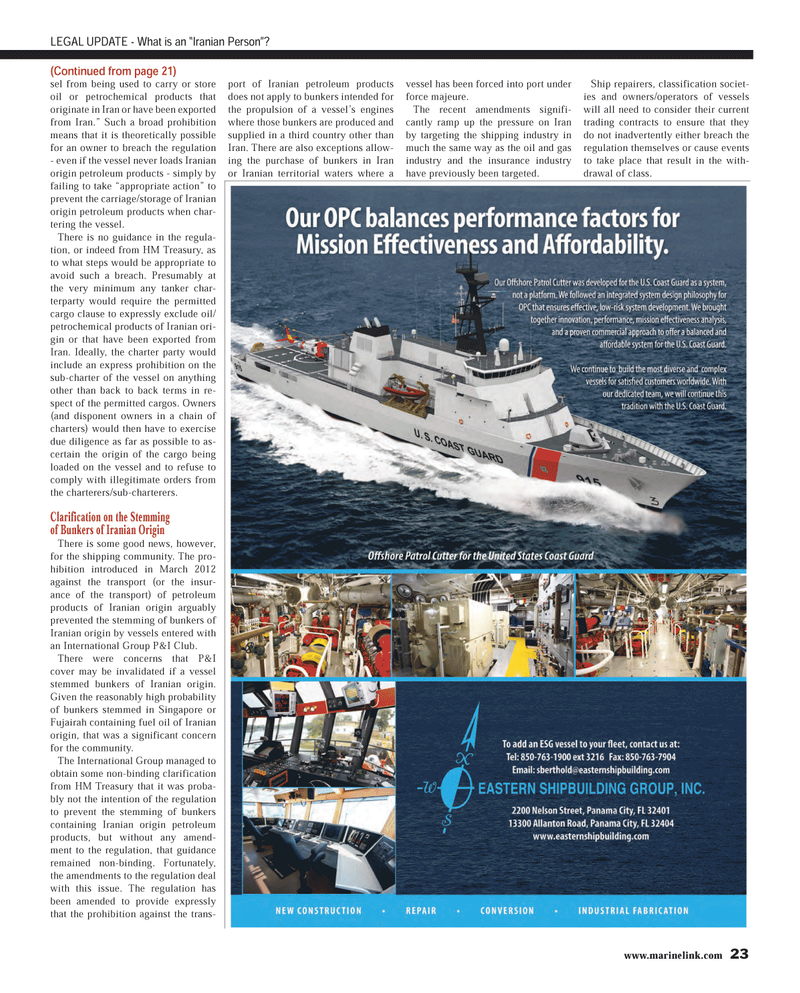
Page 23: of Maritime Reporter Magazine (March 2013)
U.S. Coast Guard Annual
Read this page in Pdf, Flash or Html5 edition of March 2013 Maritime Reporter Magazine
www.marinelink.com 23LEGAL UPDATE - What is an ?Iranian Person?? (Continued from page 21)sel from being used to carry or store oil or petrochemical products that originate in Iran or have been exported from Iran.? Such a broad prohibition means that it is theoretically possible for an owner to breach the regulation - even if the vessel never loads Iranian origin petroleum products - simply by failing to take ?appropriate action? to prevent the carriage/storage of Iranian origin petroleum products when char- tering the vessel.There is no guidance in the regula-tion, or indeed from HM Treasury, as to what steps would be appropriate to avoid such a breach. Presumably at the very minimum any tanker char- terparty would require the permitted cargo clause to expressly exclude oil/ petrochemical products of Iranian ori-gin or that have been exported from Iran. Ideally, the charter party would include an express prohibition on the sub-charter of the vessel on anything other than back to back terms in re-spect of the permitted cargos. Owners (and disponent owners in a chain of charters) would then have to exercise due diligence as far as possible to as-certain the origin of the cargo being loaded on the vessel and to refuse to comply with illegitimate orders from the charterers/sub-charterers.Clarification on the Stemming of Bunkers of Iranian OriginThere is some good news, however, for the shipping community. The pro- hibition introduced in March 2012 against the transport (or the insur- ance of the transport) of petroleum products of Iranian origin arguably prevented the stemming of bunkers of Iranian origin by vessels entered with an International Group P&I Club. There were concerns that P&I cover may be invalidated if a vessel stemmed bunkers of Iranian origin. Given the reasonably high probability of bunkers stemmed in Singapore or Fujairah containing fuel oil of Iranian origin, that was a significant concern for the community. The International Group managed to obtain some non-binding clarification from HM Treasury that it was proba- bly not the intention of the regulation to prevent the stemming of bunkers containing Iranian origin petroleum products, but without any amend-ment to the regulation, that guidance remained non-binding. Fortunately, the amendments to the regulation deal with this issue. The regulation has been amended to provide expressly that the prohibition against the trans-port of Iranian petroleum products does not apply to bunkers intended for the propulsion of a vessel?s engines where those bunkers are produced and supplied in a third country other than Iran. There are also exceptions allow- ing the purchase of bunkers in Iran or Iranian territorial waters where a vessel has been forced into port under force majeure.The recent amendments signifi-cantly ramp up the pressure on Iran by targeting the shipping industry in much the same way as the oil and gas industry and the insurance industry have previously been targeted. Ship repairers, classification societ-ies and owners/operators of vessels will all need to consider their current trading contracts to ensure that they do not inadvertently either breach the regulation themselves or cause events to take place that result in the with-drawal of class.MR #3 (18-25).indd 23MR #3 (18-25).indd 232/26/2013 3:56:39 PM2/26/2013 3:56:39 PM

 22
22

 24
24
